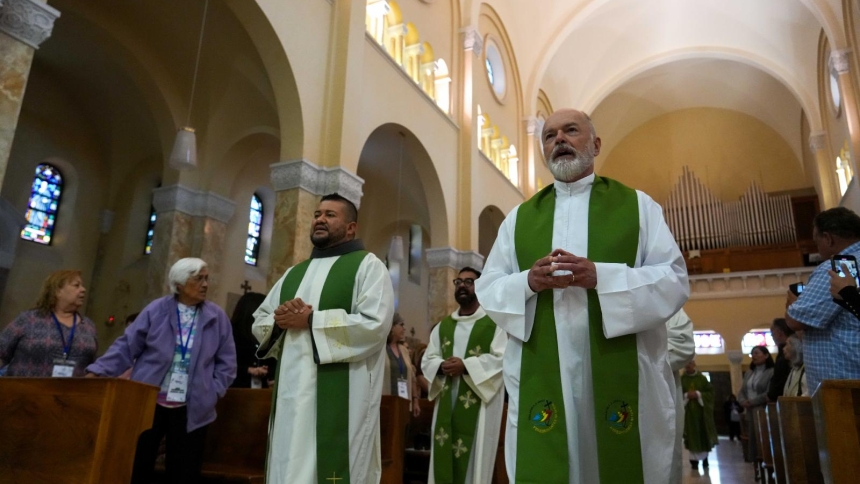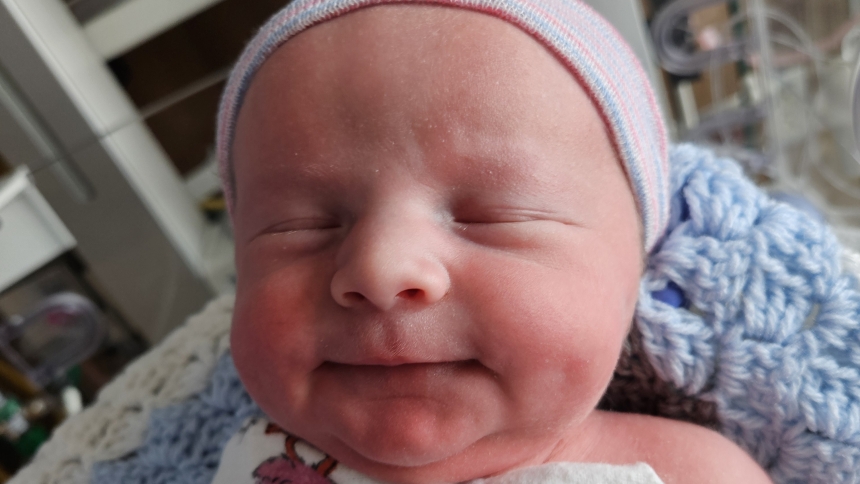
ROME (CNS) - Amid the fear and confusion facing immigrants in the United States, Catholics who minister with them see signs of hope and celebrated that during the Jubilee of Migrants.
"I find signs of hope both in the people who arrive and in those of us who receive them; the people who arrive -- it's incredible the challenges that they face and that meet them," said Sister Veronica Mendez, a member of the Sisters of Our Lady of Christian Doctrine, who works in Rockland County, New York.
Sister Mendez was one of 98 participants in the National Catholic Council for Hispanic Ministry "Pilgrimage of Hope" to Rome for the Jubilee of Migrants Oct. 4-5.
"It's not an easy kind of hope. Pope Francis taught us that hope is both a gift and a duty," Dylan Corbett, executive director of the Hope Border Institute in El Paso, Texas, told the group Oct. 3.
"And he told us we must recover and organize hope. It cannot just be platitudes or empty words," Corbett said. "As church, we are called to organize hope in very concrete ways that must be reflected at the grassroots level - it is the essence of pastoral work."
Sister Mendez said besides the migrants being signs of hope because of their steadfast faith and determination to build better lives for their families, she sees signs of hope in the parishioners who are reaching out to help.
In her community, she said, most of the migrants come from Ecuador. Before U.S. President Donald Trump began his massive immigration raids, the local parish would have 100 people come to the food pantry on Saturday mornings. Now, she said, it's 20 or 25 people.
But the parishioners prepare food bags so Sister Mendez can deliver them to the families who are afraid to leave their homes or congregate in places known as gathering spots for migrants.
Auxiliary Bishop Evelio Menjivar-Ayala of Washington, who was born in El Salvador and arrived in the United States in the trunk of a car in 1990, became a U.S. citizen in 2006 and a bishop in 2022.
When it came time to choose an episcopal motto, he told the group, "What came to my mind and heart" was a phrase from the story of the disciples on the road to Emmaus in Luke 24: "He walked with them."
In the Gospel story, the disciples are walking away from Jerusalem after Jesus' crucifixion.
"They were walking away in sadness, in despair, after the loss of their teacher," he said. "They were without hope, so much so that they didn't recognize Jesus when he joined them on the road. But when they heard this 'stranger' speaking -- when Jesus began explaining the Scriptures --their hearts began to burn. They were filled with new hope."
"As we see the night of fear, the night of uncertainty, the night of not knowing where the road leads, falling over our communities" of migrants, the bishop said, the church as the body of Christ must walk with them.
"The church must be that community of disciples that practices radical hospitality: opening the home to the stranger, breaking bread, offering friendship," he said.
Jesuit Father Allan Figueroa Deck, a scholar of theology and Latino studies at Loyola Marymount University in Los Angeles, told the group that migrants are "a blessing, because they bring so much," including a strong work ethic, a sense of family and a deep and active faith.
"We could add more qualities, but the point is if this country (the United States) turns its back on immigrants, it is turning its back on people who have come to contribute something great - to make this country better, not worse," he said.
Carmen Ramos, director of Renovación at Marian University in Indianapolis, said that at "a time where there's polarization and divisiveness," she sees hope in people's "longing for connection and unity."
Part of the Renovación program is an effort to build bridges between different communities, including cultural and ethnic communities, in a parish, she said. "As Catholics, we have a great opportunity right now more than ever to learn how to walk together and to begin at home, because we have communities where, you know, people sometimes share a space but don't really talk to each other or don't really interact."
Andrew Mercado, director of ministry at Dominican University in River Forest, Illinois, said he finds signs of hope in the work his university and Catholic universities across the country are doing to welcome and educate migrants and the children of migrants.
Unfortunately, he said, many of those students are afraid to attend classes now, fearing they will be stopped by immigration agents on the way to school.
Father Alejandro López Cardinale, pastor of St. Benedict Parish in Somerville, Massachusetts, said his parish is largely Salvadoran -- first, second and third generation. But a Sunday Mass that used to draw 1,000 people now draws 500 because of fear. So far, he said, "five families have been divided" by the mother or father being taken into custody or deported.
One sign of hope, he said, is the number of second- and third-generation Salvadorans who are studying politics or law. "They know that the only way to change things is to change the people that are in the House of Representatives or in the Senate, so I see hope in them, because they wanted to make a broader impact."
Caption: Father Alejandro López Cardinale, pastor of St. Benedict Parish in Somerville, Mass., processes into Mass during the meeting of the U.S. National Catholic Council for Hispanic Ministry in Rome in conjunction with the Jubilee for Migrants Oct. 3, 2025. (CNS photo/Lola Gomez)

